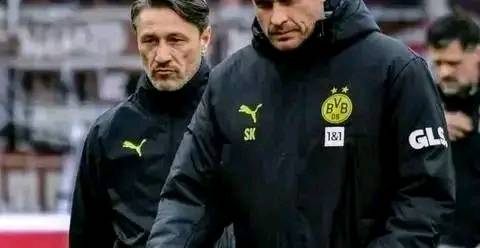Borussia Dortmund, one of the most iconic clubs in German and European football, is at the center of a swirling storm of speculation after unverified reports suggested UEFA may be preparing a harsh financial indictment that could lead to an unprecedented three-year transfer ban. While no official confirmation has emerged from UEFA or Borussia Dortmund, the mere possibility of such a sanction has sent shockwaves through the footballing world. Fans are reeling, experts are warning of catastrophic fallout, and the entire landscape of European football could be on the verge of a seismic shift if such punishment were ever imposed.
Historically, Borussia Dortmund has operated with a model that combines smart scouting, youth development, and strategic sales to maintain competitiveness without the kind of financial firepower seen at clubs like Manchester City, Real Madrid, or Paris Saint-Germain. The club’s ability to identify and develop stars like Erling Haaland, Jude Bellingham, and Jadon Sancho has not only fueled sporting success but also generated the financial returns necessary to sustain operations. Yet even this model, praised by many for its sustainability and innovation, does not make the club immune to UEFA’s increasingly strict financial sustainability rules.
Over the past few years, UEFA has transitioned from the original Financial Fair Play framework to a newer, more robust Financial Sustainability regime, which includes strict limits on squad spending, agent fees, and transfer costs relative to income. Under this updated system, clubs must meet thresholds for solvency, cost control, and break-even performance. Noncompliance can lead to a range of sanctions, including fines, restrictions on registering new players in European competitions, limits on squad sizes, point deductions, and, in extreme cases, disqualification from competitions. While UEFA has never previously issued a full three-year ban on transfer activity, the rules in place do not explicitly rule out such a punishment if a club is found guilty of serious and repeated violations.
What gives this rumor weight is the fact that Borussia Dortmund has previously been identified by UEFA as a club that narrowly complied with financial rules thanks to temporary allowances granted during the COVID-19 pandemic. Those allowances have now expired, and current evaluations are based on stricter interpretations of the regulations. Dortmund, in its own financial disclosures, has acknowledged that failing to meet UEFA’s sustainability rules is a real and material risk. The club’s 2023/24 financial reports specifically mention the danger of sanctions such as disqualification from European competitions or transfer restrictions if their financial management does not align with the governing body’s expectations.
Still, as of now, no reputable source has confirmed that UEFA has opened formal proceedings against Dortmund that would lead to a multi-year transfer ban. In previous high-profile cases involving financial breaches—such as those involving Chelsea, Barcelona, Juventus, and others—UEFA has mostly opted for fines, settlement agreements, or temporary limits on UEFA competition registration, rather than all-encompassing transfer bans. Even in the most extreme case to date, Juventus was excluded from the UEFA Conference League for one season, not banned from making transfers.
It is this lack of precedent that makes the rumor of a three-year ban so explosive. Such a measure would be unlike anything UEFA has ever attempted, and would undoubtedly prompt a major legal battle. Borussia Dortmund would almost certainly appeal any such ruling to the Court of Arbitration for Sport, citing disproportionate punishment, procedural concerns, and the potential long-term damage to the club’s viability. Legal experts suggest that unless UEFA can prove flagrant, repeated, and deliberate breaches of the rules—and that lesser sanctions would be insufficient—a court would be unlikely to uphold such a severe punishment.
Nevertheless, the hypothetical scenario is worth exploring because the consequences would be so dramatic. A club like Dortmund, which relies heavily on the ability to scout, sign, and develop young talent, would be crippled by a prolonged inability to bring in new players. Over the course of three years, key players would leave, the squad would age, injuries would mount, and the team’s competitiveness would erode. Without fresh talent, Dortmund would likely struggle in both the Bundesliga and European competitions, and failure to qualify for the Champions League could lead to a vicious cycle of reduced income, declining performance, and financial stress.
The impact would not be limited to the club alone. The Bundesliga would lose one of its most powerful and popular institutions, reducing its competitiveness and appeal to global audiences. Bayern Munich’s domestic dominance could become even more entrenched, while emerging clubs like Bayer Leverkusen or RB Leipzig might benefit in the short term but would also face new pressures to comply with financial rules more rigidly. German football as a whole would suffer a reputational blow, as one of its most community-focused and historically rich clubs fell from grace under the weight of regulatory punishment.
In broader terms, European football could experience a chilling effect. If UEFA truly follows through with such an unprecedented measure, it would send a message to every club on the continent: no one is above the financial rules, no matter how prestigious or well-run their operation appears. Clubs that are currently investing heavily in hopes of joining the elite might hesitate. Investors could be spooked. Boards would be more conservative, and risk-taking could decline across the board. At the same time, critics would question whether the regulations are being applied evenly. Is UEFA truly cracking down on all violators, or only those without state backing or political clout? If a club like Dortmund is made an example of, what does that say about the enforcement of financial regulations when other clubs operate under less transparent models?
Supporters would likely rally to defend the club, especially given Dortmund’s unique status as a fan-owned institution with deep community roots. Unlike many modern clubs run by hedge funds or billionaires, BVB remains publicly traded and heavily influenced by its membership base. Outrage over perceived regulatory overreach could spark protests, legal challenges, and political involvement in Germany and beyond. The German FA might find itself in conflict with UEFA if the national federation sees the punishment as disproportionate or damaging to the sport in the country.
In the long term, this situation could mark a turning point in how football balances ambition, regulation, and sustainability. The pressure on UEFA to act decisively against financial abuse is real, especially after years of criticism that Financial Fair Play lacked teeth. But if UEFA goes too far in the other direction—issuing extreme sanctions without airtight legal and ethical justification—it risks undermining trust in its governance model. Clubs need clear rules, fair enforcement, and transparent processes if they are to plan for the future responsibly. A dramatic sanction, if perceived as arbitrary or politically motivated, could push clubs and federations toward alternative competition models, reigniting discussions of breakaway leagues or revised tournament structures.
Ultimately, while there is no hard evidence at this stage to confirm that Borussia Dortmund faces a three-year transfer ban, the fact that such a possibility is even being discussed speaks volumes about the state of modern football. Financial regulation is no longer a background issue—it is a central axis of the sport’s future. Whether the rumor proves true or not, the very idea that a club of Dortmund’s stature could be brought to its knees by financial rules is a warning to all clubs navigating the fine line between ambition and sustainability. What happens next could reshape not only Borussia Dortmund’s destiny, but also the future balance of power across all of European football.



